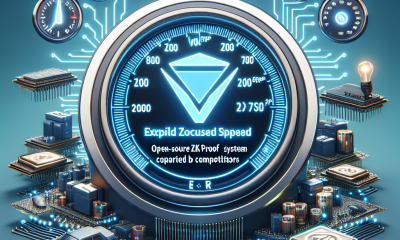Altcoins
Spot Ethereum ETF Approval Signals Bright Future for Ethereum, Asserts Kaiko Research

Kaiko Research’s recent announcement regarding the approval of spot ethereum ETFs by regulatory bodies has sparked optimism in the cryptocurrency sector. This development is seen as a significant milestone for Ethereum, potentially paving the way for its long-term growth. The regulatory green light not only clarifies Ethereum’s classification but also indicates a broader acceptance of digital assets in the financial markets.
Ethereum, often hailed as the leading altcoin, has been at the forefront of discussions concerning regulatory compliance and market viability. Will Cai, Head of Indices at Kaiko, remarked on the decisive nature of the U.S. Securities and Exchange Commission’s (SEC) stance towards Ethereum. According to Cai, the SEC’s approval solidifies Ethereum’s status as a commodity, setting a critical precedent for the regulatory treatment of other digital tokens within the U.S. market. This distinction is vital for Ethereum’s adoption and integration into the global financial system.
However, the journey towards full regulatory approval still requires the clearing of additional hurdles, including the SEC’s review of the ETFs’ S-1 orders. The anticipation surrounding these developments suggests that spot Ethereum ETFs could become available in the near future, introducing a new chapter in cryptocurrency investment strategies.
Despite the optimistic outlook, the immediate impact may bring some volatility, especially for existing investment products like Grayscale’s Ethereum fund (ETHE). With over $12 billion in assets under management, the transition of ETHE into an ETF format is expected to lead to approximately $112 million in average daily outflows. This potential shift recalls the experience of the Grayscale bitcoin fund (GBTC), which saw significant withdrawals during its first month of ETF conversion. Nevertheless, the subsequent balance achieved through other ETFs hints at a stabilizing effect likely to benefit Ethereum in the long term.
On the international stage, Ethereum ETFs have faced challenges, particularly in Hong Kong, where they have experienced $4.5 million in net outflows since their launch. This contrast with the U.S. developments underlines the varied reception of cryptocurrency investment products across different markets.
Kaiko’s analysis extends to the broader impacts on Ethereum’s market dynamics, noting significant changes in trading patterns and market depth following the FTX collapse. The decreased market concentration in the U.S., from 50% to 41%, reflects a decentralization trend and underscores the shifting landscape of Ethereum trading. These developments signal a complex interplay of regulatory, market, and technological factors influencing Ethereum’s future.
The approval of Ethereum ETFs marks a significant milestone in the integration of cryptocurrencies with traditional financial markets. As regulatory clarity improves and investment mechanisms evolve, Ethereum stands at a critical juncture, poised for long-term growth amid short-term challenges. The unfolding landscape presents opportunities for innovation, investment, and broader acceptance of digital assets, framing the next chapter in the cryptocurrency narrative.
Altcoins
South Korea to Reassess 600 Cryptocurrencies for Exchange Compliance Under New User Protection Act

In a significant move to enhance investor protection and ensure compliance with emerging regulations, South Korea’s financial authorities are set to initiate a reviewing process for around 600 cryptocurrencies currently traded on domestic platforms. This decisive step comes in the light of the newly enacted Virtual Asset User Protection Act, which will come into force on July 19th. The Act is part of South Korea’s broader strategy to establish a more regulated and secure digital asset environment.
The impending review underscores a paradigm shift in how South Korea governs its bustling crypto market. Traditionally, crypto exchanges in South Korea independently conducted internal assessments to decide which digital assets to list. However, under the newly introduced best practice plan, a more rigorous process instituted by government authorities will supplement these reviews. As a result, every cryptocurrency seeking listing on local exchanges must now satisfy a set of stringent requirements outlined by the financial watchdogs.
Amid growing concerns over potential delistings triggered by heightened regulatory scrutiny, an official from the financial regulatory body underscored the inevitability of withdrawing support for digital assets that fail to meet the new maintenance standards. This statement signals a firm governmental stance on ensuring the utmost quality and security of cryptocurrencies available to South Korean investors.
Key among the nine stringent listing requirements are the assurances of a cryptocurrency’s structural suitability for listing, the reliability of its issuer, the implementation of protections for users, an evaluation of its technological security robustness, and its adherence to local regulations and laws. Notably, the reliability assessment of issuors will involve scrutinizing their disclosure practices and verifying the circulation of the cryptocurrency.
Of paramount concern to authorities is also the cybersecurity of digital assets. To this end, cryptocurrencies that have experienced hacking incidents or those that fail to disclose their smart contract source codes will be deemed ineligible for listing. Additionally, coins and tokens directly issued by exchanges, alongside those obscuring transaction histories or contravening current legal standards, will be precluded from listing.
Nevertheless, the review process extends beyond merely ticking off a checklist of formal requirements. Cryptocurrencies seeking listings must convincingly demonstrate thorough disclosure practices, a logical issuance and circulation model, and a reliable business track record. Moreover, even if a digital asset satisfies all formal criteria, it may still face scrutiny and potentially not be listed based on qualitative evaluations—except for those assets which have been traded on well-regulated foreign exchanges for more than two years without issues.
South Korea, housing 29 domestic crypto exchanges with Upbit leading by virtue of having the 13th highest trading volume globally as per CoinGecko data, is bracing for the potential ramifications of this regulatory overhaul. The new measures are poised to significantly impact the local crypto market, especially given that altcoins represent over 60.5% of the market’s trading volume. Cryptocurrencies that exhibit low trading volumes or have issues with their listing disclosures are anticipated to face delisting first.
This comprehensive approach by South Korean authorities illustrates a concerted effort to not only safeguard investors but also instill greater transparency and accountability in the domestic cryptocurrency landscape. As the global interest in digital assets continues to burgean, such regulatory initiatives could serve as a blueprint for other nations grappling with the challenges of overseeing a rapidly evolving and often volatile digital asset market.
Altcoins
Ethereum Bullish Trend Gains Traction as Accumulation Addresses Skyrocket, Signaling Market Optimism

ethereum, the blockchain platform known for its versatility and smart contract functionality, is witnessing a bullish trend as indicated by the surge in accumulation addresses. Accumulation addresses refer to wallets that have experienced withdrawals or transfers, encompassing both cold (offline) and hot (online) storage solutions. This uptick in accumulation is a critical indicator of market sentiment, often analyzed by market experts to forecast future price movements.
Recent data from on-chain analysis firm CryptoQuant has revealed a noteworthy increase in the number of Ethereum accumulation addresses. The number has risen to over 3,720 wallets, signaling a robust interest from holders. This is particularly evident when dissecting the data further into two distinct classifications of wallets: those holding between 10 to 10,000 eth and those with 10,000 to 100,000 ETH. The former group now holds approximately 247,150 ETH, while the latter controls around 374,200 ETH as of May 26. Comparatively, on May 1, these figures were significantly lower, 22.7K ETH for the former group and 30.2K ETH for the latter, highlighting a remarkable increase in holdings.
Parallel to this, Ethereum whales – entities with substantial quantities of ETH – have also been noted for their bullish activities. The transaction value exceeding $100,000 has hit a new peak this year, as reported by IntoTheBlock, suggesting an aggressive accumulation by larger holders. This surge in whale transactions is partly inspired by growing interest from traditional finance investors looking for lucrative opportunities in the digital asset space.
The ripple effect of this bullish sentiment is also visible in Ethereum’s trading volume, which has seen a significant upsurge. This is indicative of the growing confidence among investors about Ethereum’s market potential, further buoyed by the anticipation of a sustained price rally. Such a trend not only benefits Ethereum but also sets a positive tone for the wider altcoin market.
An interesting factor contributing to the heightened accumulation activity is the approval of spot bitcoin ETFs earlier this year, which propelled the Bitcoin price to an all-time high of over $73,150. Following Bitcoin’s lead, investors have also turned their attention to Ethereum, in anticipation of a similar momentum post the approval of spot Ethereum ETFs. The speculation surrounding these approvals has been a catalyst for the recent price surge, with Ethereum’s price hovering around $3,952, marking a 2.5% increase over the last 24 hours and a 25.5% weekly rally.
In an intriguing development, a significant Ethereum whale transaction was recorded, involving the transfer of 42,392 ETH to an unknown wallet. Such movements are closely watched by market analysts as they can provide insights into potential market directions.
Furthermore, the crypto community remains buoyant about other digital assets as well, with the FLOKI price witnessing a 23.5% increase, buoyed by soaring social sentiment. These patterns indicate a market that is increasingly driven by both speculative interest and genuine belief in the long-term value proposition of digital currencies.
In testament to the excitement surrounding Ethereum, and the broader crypto market, the latest trends in accumulation addresses and whale transactions underscore a positive market sentiment. As the digital asset landscape continues to evolve, Ethereum’s position as a cornerstone technology, combined with rising investor interest, suggests a promising future for its valuation and broader adoption within the digital economy.
Altcoins
Spotlight on Solana: Hopes Rise for Solana ETF Amid Ethereum’s ETF Approval Buzz

The growing anticipation within the financial markets surrounding the possible approval of a spot ethereum ETF has sparked a wave of enthusiasm for similar financial products tailored to other cryptocurrencies, notably solana (sol). This momentum is a reflection of broader interest within the investment community looking for diversified exposure to the burgeoning digital asset class.
Recently, a notable wave of discussion has emerged concerning the potential for Solana to join Ethereum in the ETF market. Brian Kelly, the CEO of BKCM, made headlines with his speculation during a CNBC segment, suggesting that Solana might be next in line to have its own cryptocurrency exchange-traded fund. This conjecture is supported by whispers from Hong Kong, where preparations for a Solana ETF seem to be quietly underway.
However, the path to a Solana ETF is speckled with distinct challenges not faced by its predecessors, bitcoin and Ethereum. For starters, there hasn’t been a futures ETF related to Solana, and more critically, the U.S. Securities and Exchange Commission (SEC) has categorized Solana as a security. This classification adds layers of complexity to any potential ETF offering. Despite these hurdles, analysis from Bloomberg’s James Seyffart hints at a future where these challenges might be overcome. The key, according to Seyffart, could lie in the approval of a futures ETF by the Commodity Futures Trading Commission (CFTC), which could, in turn, bolster the chances for a Solana spot ETF. Moreover, the FIT21 Crypto Bill might expedite this process by providing a clearer regulatory framework for cryptocurrencies.
Nonetheless, the SEC’s firm stance on Solana being a security casts a significant shadow over its ETF prospects. Seyffart also pointed out a noticeable lack of interest in ETFs for other cryptocurrencies like Litecoin (LTC) and Dogecoin (DOGE), indicating a possible uphill battle for any candidates beyond the major players. This sentiment is echoed by major ETF issuers who have shown a preference for sticking to Bitcoin and Ethereum.
In the midst of this evolving narrative, Hunter Horsley, CEO of Bitwise Investment, has voiced a different perspective. He argues against the necessity for separate altcoin ETFs. According to Horsley, Bitwise’s 10 Crypto Index Fund offers an already diversified investment product that includes exposure not just to Bitcoin and Ethereum, but also to Solana among the top ten cryptocurrencies.
Despite the logical arguments in favor of expanding the ETF landscape to include Solana and potentially other altcoins, the proposition has not been universally welcomed. A faction of the cryptocurrency community, often referred to as Bitcoin maximalists, view the move with skepticism. One such individual, self-styled as “The Bitcoin Therapist,” has expressed concern that including Ethereum, and by extension potentially Solana, into the spot ETF arena opens the door to a plethora of lesser-known and possibly less stable cryptocurrencies, derisively dubbed “shitcoins.” This school of thought fears that the sanctity and prime focus on Bitcoin could be diluted, leading to what some describe as a “free market casino.”
As the situation unfolds, it’s clear that the dialogue surrounding spot ETFs for cryptocurrencies beyond Bitcoin and Ethereum is just beginning. While some see these developments as a natural progression towards a more inclusive financial ecosystem encompassing a wider array of digital assets, others caution against moving too swiftly. The potential of a Solana ETF brings to light not only the evolving dynamics of cryptocurrency investments but also the broader debates on regulation, market stability, and the essence of value within the digital asset space. These discussions hint at the burgeoning maturity of the market but also underline the significant divergences in vision within the cryptocurrency community.
-

 Cryptocurrency2 months ago
Cryptocurrency2 months agoExploring the Future of Finance: Regulated Settlement Network PoC Aims to Unify Banking and Securities on a Single Platform
-

 Cryptocurrency4 weeks ago
Cryptocurrency4 weeks agoFantom Foundation Boosts Blockchain Performance with Opera Upgrade to Hit 2000 TPS, Following Google Cloud Partnership
-

 Cryptocurrency2 months ago
Cryptocurrency2 months agoProtocol Village Announces ‘Expander’: An Open-Source ZK Proof System Doubling Speed Compared to Competitors
-

 Cryptocurrency1 month ago
Cryptocurrency1 month agoOpenAI Gears Up for Exciting ChatGPT Update: New Features and Potential Pricing Changes on the Horizon
-

 Altcoins1 month ago
Altcoins1 month agoFive Altcoins Including Pepe Coin and FLOKI Eye Major Gains: A Path to Turn $10,000 into $1 Million Revealed
-

 Cryptocurrency2 months ago
Cryptocurrency2 months agoDr. Ted Kaouk Named Inaugural Chief AI Officer by CFTC
-

 Cryptocurrency2 months ago
Cryptocurrency2 months agoDropbox Suffers Significant Data Breach: A Detailed Look at the Incident
-

 Memecoins2 months ago
Memecoins2 months agoTop Cryptocurrencies Poised for Growth in 2024



